Unit 12 What did you do last weekend 单元复习课件-七年级英语下册同步精品课堂(人教版)
文档属性
| 名称 | Unit 12 What did you do last weekend 单元复习课件-七年级英语下册同步精品课堂(人教版) | 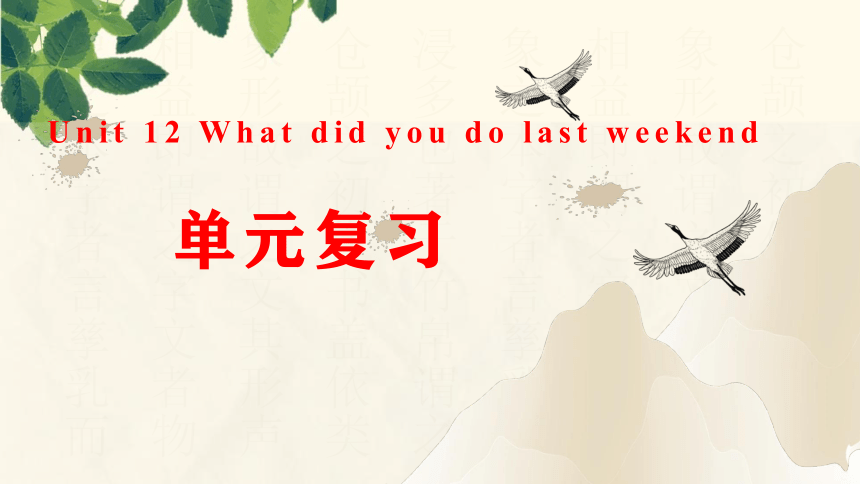 | |
| 格式 | pptx | ||
| 文件大小 | 2.2MB | ||
| 资源类型 | 试卷 | ||
| 版本资源 | 人教新目标(Go for it)版 | ||
| 科目 | 英语 | ||
| 更新时间 | 2024-04-14 11:50:52 | ||
图片预览

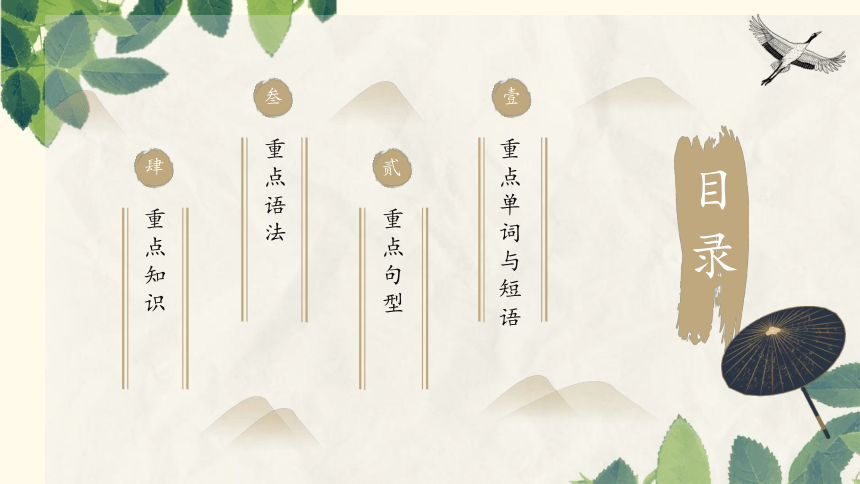

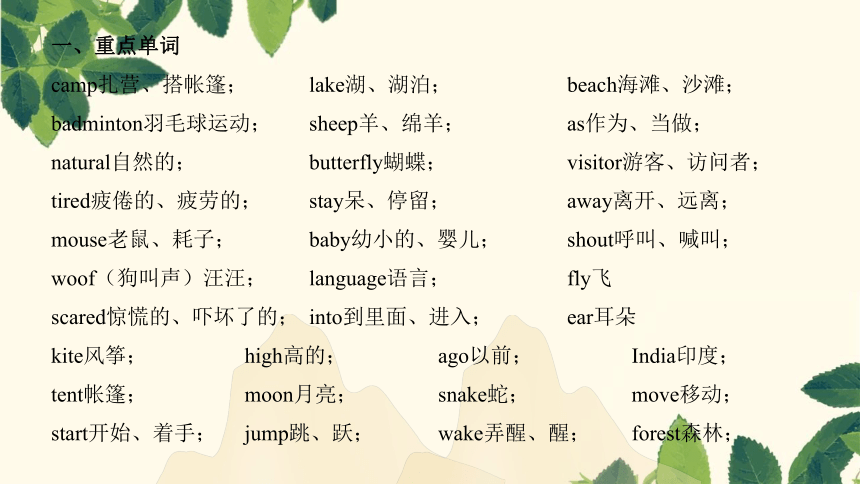
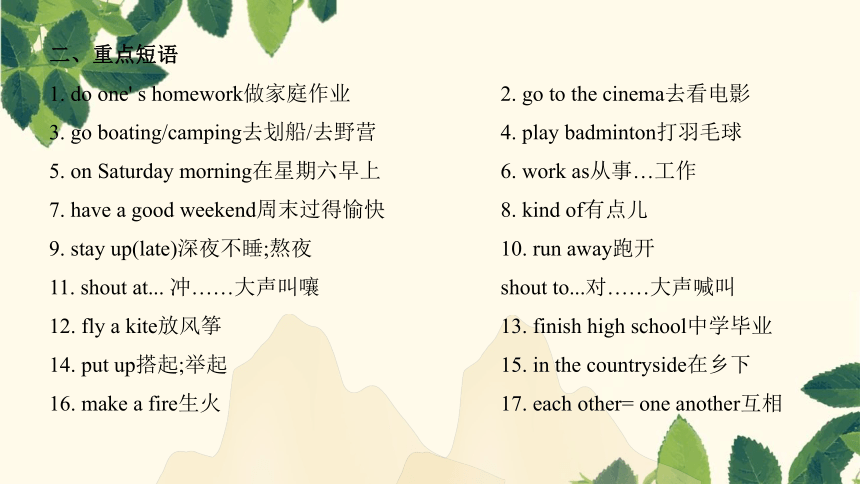
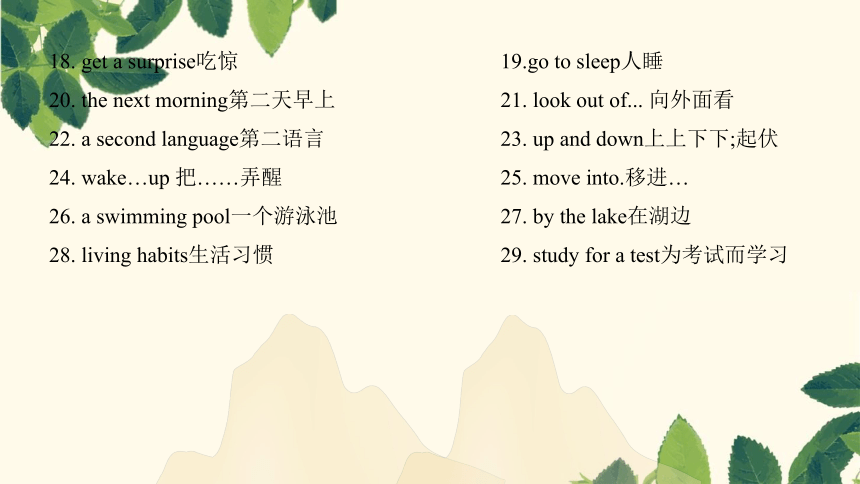

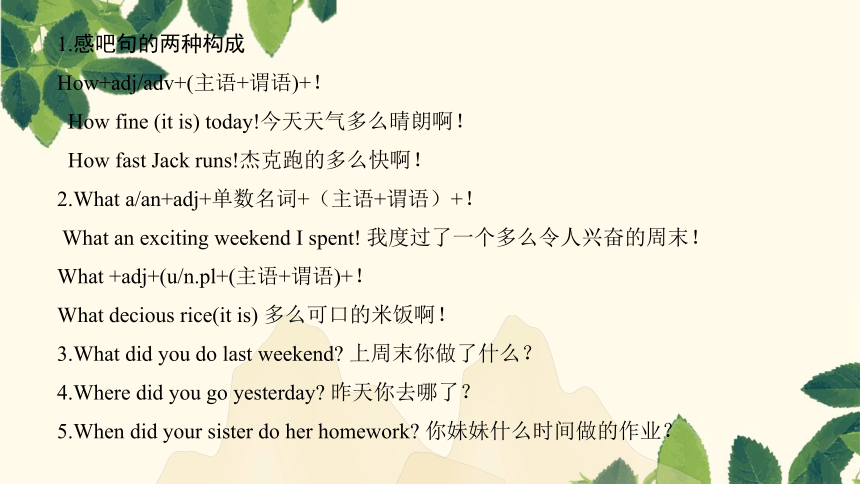
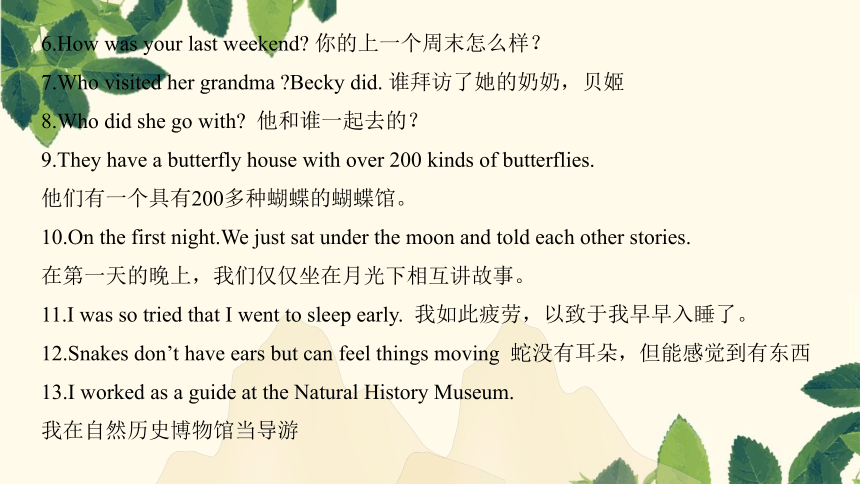


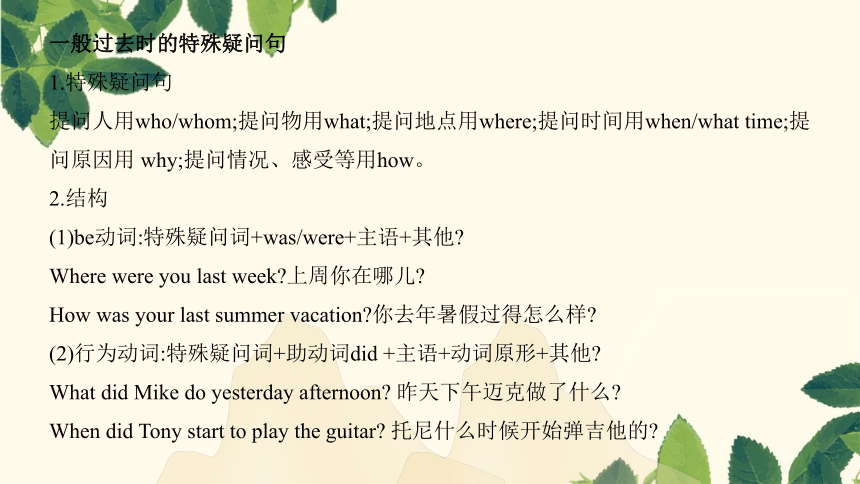
文档简介
(共45张PPT)
仓颉之初作书盖依类象形故谓之文其形声相益即谓之字文者物象之本字者言孳乳而浸多也著于竹帛谓之仓颉之初作书盖依类象形故谓之文其形声相益即谓之字文者物象之本字者言孳乳而
单元复习
Unit 12 What did you do last weekend
重点单词与短语
壹
重点句型
贰
重点语法
叁
重点知识
肆
目录
仓颉之初作书盖依类象形故谓之文其形声相益即谓之字文者物象之本字者言孳乳而浸多也著于竹帛谓之仓颉之初作书盖依类象形故谓之文其形声相益即谓之字文者物象之本字者言孳乳而
重点单词与短语
第一部分
壹
一、重点单词
camp扎营、搭帐篷; lake湖、湖泊; beach海滩、沙滩;
badminton羽毛球运动; sheep羊、绵羊; as作为、当做;
natural自然的; butterfly蝴蝶; visitor游客、访问者;
tired疲倦的、疲劳的; stay呆、停留; away离开、远离;
mouse老鼠、耗子; baby幼小的、婴儿; shout呼叫、喊叫;
woof(狗叫声)汪汪; language语言; fly飞
scared惊慌的、吓坏了的; into到里面、进入; ear耳朵
kite风筝; high高的; ago以前; India印度;
tent帐篷; moon月亮; snake蛇; move移动;
start开始、着手; jump跳、跃; wake弄醒、醒; forest森林;
二、重点短语
1. do one' s homework做家庭作业 2. go to the cinema去看电影
3. go boating/camping去划船/去野营 4. play badminton打羽毛球
5. on Saturday morning在星期六早上 6. work as从事…工作
7. have a good weekend周末过得愉快 8. kind of有点儿
9. stay up(late)深夜不睡;熬夜 10. run away跑开
11. shout at... 冲……大声叫嚷 shout to...对……大声喊叫
12. fly a kite放风筝 13. finish high school中学毕业
14. put up搭起;举起 15. in the countryside在乡下
16. make a fire生火 17. each other= one another互相
18. get a surprise吃惊 19.go to sleep人睡
20. the next morning第二天早上 21. look out of... 向外面看
22. a second language第二语言 23. up and down上上下下;起伏
24. wake…up 把……弄醒 25. move into.移进…
26. a swimming pool一个游泳池 27. by the lake在湖边
28. living habits生活习惯 29. study for a test为考试而学习
仓颉之初作书盖依类象形故谓之文其形声相益即谓之字文者物象之本字者言孳乳而浸多也著于竹帛谓之仓颉之初作书盖依类象形故谓之文其形声相益即谓之字文者物象之本字者言孳乳而
重点句型
第二部分
贰
1.感吧句的两种构成
How+adj/adv+(主语+谓语)+!
How fine (it is) today!今天天气多么晴朗啊!
How fast Jack runs!杰克跑的多么快啊!
2.What a/an+adj+单数名词+(主语+谓语)+!
What an exciting weekend I spent! 我度过了一个多么令人兴奋的周末!
What +adj+(u/n.pl+(主语+谓语)+!
What decious rice(it is) 多么可口的米饭啊!
3.What did you do last weekend 上周末你做了什么?
4.Where did you go yesterday 昨天你去哪了?
5.When did your sister do her homework 你妹妹什么时间做的作业?
6.How was your last weekend 你的上一个周末怎么样?
7.Who visited her grandma Becky did. 谁拜访了她的奶奶,贝姬
8.Who did she go with 他和谁一起去的?
9.They have a butterfly house with over 200 kinds of butterflies.
他们有一个具有200多种蝴蝶的蝴蝶馆。
10.On the first night.We just sat under the moon and told each other stories.
在第一天的晚上,我们仅仅坐在月光下相互讲故事。
11.I was so tried that I went to sleep early. 我如此疲劳,以致于我早早入睡了。
12.Snakes don’t have ears but can feel things moving 蛇没有耳朵,但能感觉到有东西
13.I worked as a guide at the Natural History Museum.
我在自然历史博物馆当导游
14.Did you have a good weekend No, I didn’t.
你周末愉快吗? 不,不愉快。
15.I stayed up late to watch the soccer game last night.
昨晚我熬夜看足球赛。
16.As a student, you must study hard.
作为一名学生,你必须努力学习
17.It’s +adj+to do sth… 做某事是……的
18.That’s why…那就是……原因
That’s why it’s important to learn a second language.
那就是学习另一种语言重要的原因。
仓颉之初作书盖依类象形故谓之文其形声相益即谓之字文者物象之本字者言孳乳而浸多也著于竹帛谓之仓颉之初作书盖依类象形故谓之文其形声相益即谓之字文者物象之本字者言孳乳而
重点语法
第三部分
叄
一般过去时的特殊疑问句
1.特殊疑问句
提问人用who/whom;提问物用what;提问地点用where;提问时间用when/what time;提问原因用 why;提问情况、感受等用how。
2.结构
(1)be动词:特殊疑问词+was/were+主语+其他
Where were you last week 上周你在哪儿
How was your last summer vacation 你去年暑假过得怎么样
(2)行为动词:特殊疑问词+助动词did +主语+动词原形+其他
What did Mike do yesterday afternoon 昨天下午迈克做了什么
When did Tony start to play the guitar 托尼什么时候开始弹吉他的
3.答语
回答特殊疑问句时,不能用 yes 或no 简要回答,而是要针对问句所提问的内容作相应的回答。
-What did you eat yesterday evening 昨天晚上你吃什么了
-I ate a banana and two apples.我吃了一根香蕉和两个苹果。
【拓展】一般过去时的判断
(1)当句中用到表示过去的时间状语时,用一般过去时。
I went to the library yesterday.昨天我去图书馆了。
(2)根据句意确知某一动作发生在过去,用一般过去时。
Edison invented many useful things.
爱迪生发明了许多有用的东西。
(3)在表示时间、让步或结果的状语从句中,一般主句用过去时,从句也用过去时。
The man drank some water after he got up in the morning.
那个男人在早上起床后喝了一些水。
仓颉之初作书盖依类象形故谓之文其形声相益即谓之字文者物象之本字者言孳乳而浸多也著于竹帛谓之仓颉之初作书盖依类象形故谓之文其形声相益即谓之字文者物象之本字者言孳乳而
重点知识
第四部分
肆
1. camped by the lake 在湖边野营
camp v. 扎营;搭帐篷
camp在此处作不及物动词,go camping意为“去野营”,camp out意为“露宿”。
Would you like to go camping with me
你想和我一起去野营吗?
【拓展】
camp也可作名词,意为“营地;度假营”。summer camp“夏令营”。
Did you go to the summer camp last year
去年你参加夏令营了吗?
2. -What did you do last weekend, Lucy 露西,上个周末你做什么了
-Well, on Saturday morning, I played badminton.哦,在周六上午我打羽毛球了。
1)问句是一个含有一 般过去时的特殊疑问句, 其中的助动词did是do的过去式。
在英语中,句子的动作发生在现在以前,即过去的时间,句子要用一般过去时。一般过去时中谓语动词要用过去式,如: do的过去式是did; go的过去式是went; am,is的过去式是was; are 的过去式是were.
-What did you do yesterday
昨天你做什么了
-| went to the hospital.
我去医院了
句子中用了助动词did时,后面的动词要用原形。
2)last weekend意为“上个周末"。weekend为名词,意为“周末”,通常指星期六和星期天两天。其对应词为weekday,即“工作日”,通常指从星期一至星期五的时间。
on weekends在周末 on weekdays在工作
当"last/next/this/that+ 时间”在句中作时间状语时,其前通常不再用介词。
He went to the beach last Sunday.
上个星期天他去海滩了。
3)play badminton意为”打羽毛球”。play与球类名词连用,表示.”....球,踢.... .球”时,球类名词前不加任何冠词。
play volleyball打排球 play football踢足球
play table tennis打乒兵球 play basketball打篮球
3.I fed some (sheep/cows). 我喂了一些 (绵羊/奶牛)。
sheep n. 羊;绵羊
sheep是可数名词,意为“羊;绵羊”,其复数形式仍然是sheep。
Sheep are eating grass in the fields.
羊在田野里吃草。
【巧学妙记】
单复数同形的可数名词
中日鱼羊鹿,是单也是复。
(注:中 — Chinese 日一Japanese
鱼一fish 羊一sheep
鹿一deer)
4.—Who visited her grandma 谁看望了她的奶奶?
— Becky did. 贝姬看望了(她的奶奶)。
do 代替上文的用法
在“Becky did.”中,did代替问句中的 visited her grandma。 英语中为了避免不必要的重复,经常用 do, does, did, so 等词来代替前面的动词(短语)或相关内容。
— Who broke the window 谁打破了窗户?
— Jack did. 杰克打破的。
代替broke the window
5. go boating 去划船
“go + V-ing形式”常用来表示从事某种活动。
go shopping 去购物 go camping 去野营 go boating 去划船 go fishing 去钓鱼
5. On Saturday morning, I played badminton.
星期六上午我打羽毛球了。
在上午/下午/ 晚上要用介词in,在具体某一天的上午/ 下午/ 晚上,则要用介词on。
in the evening 在晚上
on Sunday evening 在周日晚上
6. I worked as a guide at the Natural History Museum.
我在自然历史博物馆里做导游的工作。
work as + 职业名词 做…工作,句中的as是介词,意为“作为;当作”。
My sister works as a nurse in a hospital.
我妹妹在一家医院当护士。
7. They have a butterfly house with over 200 kinds of butterflies!
它们(指博物馆)有一个有200多种蝴蝶的蝴蝶馆!
1)butterfly house 表示“蝴蝶馆”。
英语中house 的含义与所处的语境密切相关。
a big house 表示“一座大房子”。但是,my house 不仅表示“我的房子”,还可表示“我的家”。
I hope you all can come over to my house this Sunday for coffee.
我希望这个礼拜天你们全都能够来我家喝咖啡。
2)句中的with是介词,意为“有;带有”。
the house with the garden 一个带有花园的房子
Who is the girl with long blonde hair 那位金色长发的女孩是谁?
3)句中的kind是名词意为“种;类”是可数名词。
与kind有关的短语有:
a kind of “一种;某种(不明确的东西)”,
kind of “有点”
many / different / all kinds of “各种各样的”
There are three kinds of fruits on the table.
桌子上有三种水果。
It is a kind of animal with long ears and small eyes.
它是一种长耳朵小眼睛的动物。
8. How interesting! 多么有趣啊!
这是一个感叹句,句子结构为:How + 形容词或副词 + (主语 + 谓语)!
How interesting the book is!
那本书太有趣了!
感叹句结构:
1) How + 形容词或副词 + (主语 + 谓语)!
2) What +(a/an)+ adj.+ 名词+(主语 + 谓语)!
How interesting the book is!
=What an interesting book it is!
那本书太有趣了!
9. I stayed up late to watch the soccer game.我熬夜看足球赛。
stay up late 深夜不睡;熬夜
Afterwards she relented(宽容) and let the children stay up late to watch TV.
后来她宽容了些,让孩子们晚睡看电视。
Don’t stay up late. It’s bad for your health.
不要熬夜,这对你的健康不好。
Let’s stay up to see the New Year.
咱们别睡觉,迎接新年的到来吧。
10. Did you have a good weekend 你周末过得愉快吗
have a good weekend周末过得愉快
have a good time 玩得高兴 have a good trip 旅途愉快
11. I told the visitors about them and their living habits.
我把这些蝴蝶以及它们的生活习性告诉给参观者。
1) visit v. visitor n.
visit +sb.看望某人 visit +sp.游览/参观某地
He is an English visitor.
I visited my aunt last weekend.
2) tell v. tell sb. about sth. 告诉某人关于某事
tell sb. sth. 告诉某人某事 =>tell sth. to sb.把某事告诉某人
tell sb.(not) to do sth. 告诉某人(不要)做某事
My mother tell me not to go out.
妈妈告诉我不要出去。
12. Father Mouse shouted at the cat, “Woof, woof!” 鼠爸爸冲猫大叫:“汪汪,汪汪!”
shout v. 呼叫;喊叫
shout 在此处作不及物动词,shout at意为“ 冲…… 大声叫嚷” ,at后接喊叫的对象。
There is someone shouting. 有人在大声叫喊。
Speak slowly. Don’t shout at others. 慢慢说。不要冲他人喊叫。
【易混辨析】shout at与shout to
shout at 意为“冲...... 大声叫嚷“,多指因生气或愤怒而冲着某人大声吼叫。
Li Ming’s mother shouted at him for his dishonesty.
妈妈因李明不诚实而对他大声嚷嚷。
shout to 意为“对 ..... 大声喊叫”,目的是让别人听见,多因距离远。
Mary shouted to us to come in and help her. 玛丽大声喊我们进来帮助她
13. “Well, son, that’s why it’s important to learn a second language,” answered Father Mouse. “所以嘛,儿子,这就是为什么再学一门语言很重要。”鼠爸爸回答道。
1)That’s why... 句型
该句型意为“这/那就是......的原因”,其中why引导的从句,表示结果。
Tom overslept this morning. That’s why he was late for school.
汤姆今天早晨睡过头了,这就是他上学迟到的原因。
【拓展】
“That’s because ... ”也是一 个常用句型,意为“这/那是因为 …… ”, because引导的从句表示原因。
Tom was late for school this morning. That’s because he overslept.
汤姆今天早晨上学迟到了,那是因为他睡过头了。
2)a second意为“又一;再一”。 a/an与序数词连用不表顺序,表示“再(一),又 (一)”
Tom took a second book after finishing reading the book.
看完这本后,汤姆又拿了一本书。
3)language n. 语言
language 在此是可数名词,a second language意为“又一门语言”。
表示某种具体语言的词,如 Chinese, English, Japanese 等,是不可数名词。
How many languages can you speak
你会说几门语言?
All the children must learn a foreign language.
所有的儿童必须学一门外语。
14.run away
run away 逃走;跑开. 是不及物动词短语,其后不能直接跟宾语。
其中away 是副词,意为“离开,远离”,常与run, go, walk, drive, ride 等动词搭配。run away from...“从……处跑开/ 逃离”。
away 构成的短语:
① go away 走开 ② give away 赠送 ③ take away 拿走
④ put away 把……收起来;放好
⑤ stay away from 远离
A monkey ran away from the zoo.一只猴子从动物园逃走了。
Don’t go away. I have a question to ask you. 别走开。我有个问题要问你。
Who will look after these children when I’m away 我走了之后,谁来照看这些孩子?
15. Did you do anything interesting last weekend
① 本句为含有实义动词do的一般过去时的一般疑问句。
句型结构:did+主语+动词原形+其他?
答语为:
Yes, 主语+ did.(肯定回答)
No, 主语+ didn’t.(否定回答)
— Did you go skating yesterday昨天你去滑冰了吗?
— Yes, I did. / No, I didn’t.是的,我去了。/不,我没去。
【拓展】含be动词的一般疑问句构成是:Be(was/were)+主语+其他?
Was he our English teacher last year
他是我们去年的英语老师吗?
② anything interesting“有趣的事”,
1)anything 任何事,任何(东西)
anything是不定代词,通常用于否定句或疑问句,放在形容词后面,not anything相当于nothing。
There isn’t anything in the box.这个盒子里什么都没有。
2)anything interesting“有趣的事”,interesting是形容词,修饰复合不定代词 anything 时,需后置。
Did you notice anything unusual in the room 你注意到房间里有什么不同寻常吗?
【拓展】形容词修饰复合不定代词,要放在复合不定代词的后面,作后置定语。
Is there anything important in the newspaper 报纸上有重要的事情吗?
After a long walk in the sun, the children wanted to drink something cold.
在阳光下长时间行走后,孩子们需要喝冷饮。
16. flew a kite 放风筝
fly v.飞
1) fly在此处为及物动词,意为 “放飞(风筝)”,其过去式为flew。
We like flying kites in spring. 我们喜欢在春天放风筝。
2) fly也可作不及物动词,意为 “乘飞机;飞;飞逝”。
fly to表示 “乘飞机去”,相当于go to... by plane/air。
Her father flew to Guangzhou yesterday.
( = Her father went to Guangzhou by air/plane yesterday. ) 她爸爸昨天乘飞机去了广州。
The bird flew away. 鸟儿飞走了。 How time flies! 时间飞逝!
【拓展】fly 还可作名词,意为 “苍蝇” ,复数形式为flies。
Look! Two flies are on the table. 看!桌子上有两只苍蝇。
17. My sister finished high school two weeks ago. 我姐姐两周前中学毕业了。
1)finish动词,意为“完成;结束"。
My English class finishes at three o'clock. 我的英语课3点结束。
2)finish后通常接名词、代词或动词的-ing 形式作宾语,不能接动词不定式。
I will finish reading the book this afternoon. 我今天下午将看完那本书。
3)ago副词,意为“...以.前”.
I met her two days ago. 我两天前碰见她了。
【辨析】ago 与before
ago“时间段+ago"表示从现在算起的若干时间以前,常用于一般过去时。
ago不能单独使用,只能用作副词
before可用作介词,后接时间点,表示“在某具体时间之前”;也可单独使用,用作副词
18. Not really, …
(1) 表示轻微的否定,意为“不很……”。
—Are you busy now 你现在忙吗
—Not really. 不怎么忙。
(2) 表示怀疑或不相信,意为“不会吧;不见得;不会是真的吧”。
—He is leaving tomorrow. 他明天就走了。
—Not really. 不会是真的吧。
(3) 表示语气很强的否定,意为“真的没有;的确没有”。
—Did you watch the news on TV last night
你昨天晚上看电视新闻了吗
—Not really. 的确没有。
19.My sister finished high school two weeks ago. 我姐姐两周前中学毕 业了。
high adj.& adv. 高的(地)
1) high作形容词,意为“高的” ,强调物体高出地面的空间高度。
The building is high. 这栋建筑很高。
high作副词,意为“高地”。既可表示物理上的高,也可表示价格、价值、评价等抽象意义上的高。
He can jump very high. 他能跳很高。
You should aim high. 你应该志向远大。
ago adv. 以前
2)ago作副词,不能单独使用,常用于“一段时间 + ago”结构,常与一般过去时连用。
He started to play the piano three years ago. 他三年前开始弹钢琴。
20.There we put up our tents and made a fire to keep us warm and cook food on.
在那里我们搭起帐篷,生火取暖并做饭。
put up 搭起;举起
put up在此意为“搭起”,是“动词 + 副词”型短语。其宾语为名词时,名词放在up之前或之后均可;宾语为代词时,代词要放在 put与up 之间。
It’s going to rain. Let’s put up the tent. 要下雨了。咱们把帐篷搭起来吧。
Here is the tent. Let’s put it up. 帐篷在这儿。咱们把它搭起来吧。
【拓展】put up的其他常见含义:
1)举起 He puts up his hand to ask a question. 他举起手来问问题。
2)张贴 They put up a notice on the wall. 他们在墙上贴了一张布告。
本句的主体部分是we put up tents and made a fire, 后续的 to keep us warm and cook food on (it) 表达的是made a fire 的目的。句尾介词“on” 后有所省略,以避免重复。
21.But I was so tired that I went to sleep early. 但是我太累了,所以早早就睡了。
so... that... 结构,意为“如此…… 以至于 ……”,是固定结构,so 后接形容词或副词,that 后接句子表示结果。
Jim is so busy that he has little time for his family.
吉姆太忙了,以至于他几乎没有时间陪他的家人。
【拓展】so... that ... 后的从句为肯定句时,该结构可与 ... enough to ... 互相转化;其后的从句为否定句时,它可以与 too ... to ... 互相转化。
The boy got up so early that he caught the early bus.
= The boy got up early enough to catch the early bus.
这个男孩起得很早,以至于他赶上了早班车。
He is so young that he can’t go to school. =He is too young to go to school.
他那么小,以至于不能去上学。
22.The next morning, my sister and I got a terrible surprise. 第二天早上,我和姐姐大吃一惊。
surprise n. 惊奇;惊讶 v. 使吃惊
1) surprise 在此处作名词,意为“惊奇,惊讶”。表示抽象事物时,用作不可数名词;表示具体事物时,用作可数名词。常用短语:
get a surprise 吃惊
I got a surprise when I saw the bill. 一看账单我吃了一惊。
give sb. a surprise 给某人一个惊喜
They give me a sueprise. 他们给我一个惊喜。
in surprise 惊奇地,惊讶地
They looked at each other in surprise.他们惊讶地看着对方。
to one’s surprise 让某人惊讶的是
To my surprise, he didn’t pass the exam. 让我惊讶的是,他没有通过考试。
2) surprise也可作及物动词,意为“使吃惊”。
The news surprised me a lot. 这消息使我非常惊讶。
3) the next morning 第二天早上(过去时) next morning明天早上(将来时)
23.When we looked out of our tent, we saw a big snake sleeping near the fire.
我们向帐篷外看时,看到了一条大蛇正在篝火旁睡觉。
1)look out of 向 ……外看
look out of后接名词或代词,其反义短语为 look into。
The boy is looking out of the window. 这个男孩正在向窗外看。
【拓展】look out意为“当心”,相当于 be careful。
Look out! Here comes a car. 当心!过来一辆小汽车。
2)see sb./sth. doing sth. 看见某人/某物正在做某事
see sb./sth. doing sth. 意为“看见某人/某物正在做某事”,强调看到动作正在发生;
see sb./sth. do sth. 意为“看到某人/某物做了某事”,强调看见动作发生的全过程,或者看到动作经常发生。
I saw him playing basketball at nine o’clock in the morning. 上午9点钟,我看到他正在打篮球。
I often see her read in the library. 我经常看到她在图书馆看书。
24.I was so scared that I couldn’t move.
我是那么害怕,一动都不敢动。
scared adj. 惊慌的;吓坏了的
scared作形容词,通常用来修饰人,常用结构有:
1)be scared of sth. /doing sth.害怕某物/做某事
My cousin isn’t scared of snakes. 我堂姐不害怕蛇。
2)be scared to do sth.害怕做某事
She is scared to climb the tree. 她害怕爬树。
【拓展】scary作形容词,意为“吓人的;恐怖的“,常用来修饰物。
The movie is scary. Can you watch it with me
这部电影很恐怖。你能和我一起看吗?
25.This woke the snake up and it moved into the forest near the lake.
这一举动惊醒了蛇,它爬进了湖边的树林里。
wake... up 把…… 弄醒
wake ... up 中的 wake作动词,意为“弄醒,醒”;up为副词。该短语为“动词 + 副词”型短语,当宾语是名词时,名词可以放在wake和up之间,也可以放在up的后面;当宾语是代词时,代词必须放在wake和up之间。
Wake up your brother. It’s time for breakfast. 把你弟弟叫醒。该吃早饭了。
I’ll wake you up for the medicine. 我会叫醒你吃药的。
【拓展】wake up 还可作不及物动词短语,意为“醒,醒来”。
My grandma usually wakes up early.
我奶奶通常醒得早。
26. As a special gift, our parents took us to India.
作为一份特殊的礼物, 我爸妈带着我们去了印度。
1) 此处介词as 表示“作为……; 当作……”,其后可以接职业,用途,特点等。用在句首时,这种短语的后面往往有逗号与句子的主体隔开。
As a student, I must work hard.
作为一名学生,我必须努力学习。
2) 本句中动词take 表示“带领”, take … to …则表示“带领某人去某处”。
On Sundays, the father would take his son to the park.
一到星期天,爸爸便会带他的儿子去公园。
【辨析】 bring, take, carry, fetch
bring 意为“拿来,带来”,表示“拿到靠说话人近的地方”。
take 意为“拿走,带走”,表示“拿到远离说话人远的地方”。
carry 意为“扛,搬”,用力移动,没有方向性。
fetch 意为“去取,去拿”表示往返拿物。
27. My dad told me later that snakes don’t have ears but he can feel things moving.
我的爸爸后来告诉我蛇没有耳朵,但是他能感觉到东西在移动。
表示感官的动词,例如see, hear, feel 等动词后可以接动词-ing 短语,表示“看见、听到、觉得某人或物在做……(某事)”。
see/watch/feel/hear sb. doing sth. 看到/观察到/觉得/听到某人在做某事
We can hear water running from the mountain. 我们能听到水从山上流下来的声音。
28.On the first night, … 在头一天夜里,……
表示一天中的时间分别采用at night (在夜里)、in the morning (在上午)、in the evening (在下午)等,但表示“在某一天上午、下午或晚上等”的特定时间,往往使用介词on。
On the early morning of November 20th, we got a special postcard.
在11月20号一大清早,我们收到了一张特殊的明信片。
仓颉之初作书盖依类象形故谓之文其形声相益即谓之字文者物象之本字者言孳乳而浸多也著于竹帛谓之仓颉之初作书盖依类象形故谓之文其形声相益即谓之字文者物象之本字者言孳乳而
谢君一赏
仓颉之初作书盖依类象形故谓之文其形声相益即谓之字文者物象之本字者言孳乳而浸多也著于竹帛谓之仓颉之初作书盖依类象形故谓之文其形声相益即谓之字文者物象之本字者言孳乳而
单元复习
Unit 12 What did you do last weekend
重点单词与短语
壹
重点句型
贰
重点语法
叁
重点知识
肆
目录
仓颉之初作书盖依类象形故谓之文其形声相益即谓之字文者物象之本字者言孳乳而浸多也著于竹帛谓之仓颉之初作书盖依类象形故谓之文其形声相益即谓之字文者物象之本字者言孳乳而
重点单词与短语
第一部分
壹
一、重点单词
camp扎营、搭帐篷; lake湖、湖泊; beach海滩、沙滩;
badminton羽毛球运动; sheep羊、绵羊; as作为、当做;
natural自然的; butterfly蝴蝶; visitor游客、访问者;
tired疲倦的、疲劳的; stay呆、停留; away离开、远离;
mouse老鼠、耗子; baby幼小的、婴儿; shout呼叫、喊叫;
woof(狗叫声)汪汪; language语言; fly飞
scared惊慌的、吓坏了的; into到里面、进入; ear耳朵
kite风筝; high高的; ago以前; India印度;
tent帐篷; moon月亮; snake蛇; move移动;
start开始、着手; jump跳、跃; wake弄醒、醒; forest森林;
二、重点短语
1. do one' s homework做家庭作业 2. go to the cinema去看电影
3. go boating/camping去划船/去野营 4. play badminton打羽毛球
5. on Saturday morning在星期六早上 6. work as从事…工作
7. have a good weekend周末过得愉快 8. kind of有点儿
9. stay up(late)深夜不睡;熬夜 10. run away跑开
11. shout at... 冲……大声叫嚷 shout to...对……大声喊叫
12. fly a kite放风筝 13. finish high school中学毕业
14. put up搭起;举起 15. in the countryside在乡下
16. make a fire生火 17. each other= one another互相
18. get a surprise吃惊 19.go to sleep人睡
20. the next morning第二天早上 21. look out of... 向外面看
22. a second language第二语言 23. up and down上上下下;起伏
24. wake…up 把……弄醒 25. move into.移进…
26. a swimming pool一个游泳池 27. by the lake在湖边
28. living habits生活习惯 29. study for a test为考试而学习
仓颉之初作书盖依类象形故谓之文其形声相益即谓之字文者物象之本字者言孳乳而浸多也著于竹帛谓之仓颉之初作书盖依类象形故谓之文其形声相益即谓之字文者物象之本字者言孳乳而
重点句型
第二部分
贰
1.感吧句的两种构成
How+adj/adv+(主语+谓语)+!
How fine (it is) today!今天天气多么晴朗啊!
How fast Jack runs!杰克跑的多么快啊!
2.What a/an+adj+单数名词+(主语+谓语)+!
What an exciting weekend I spent! 我度过了一个多么令人兴奋的周末!
What +adj+(u/n.pl+(主语+谓语)+!
What decious rice(it is) 多么可口的米饭啊!
3.What did you do last weekend 上周末你做了什么?
4.Where did you go yesterday 昨天你去哪了?
5.When did your sister do her homework 你妹妹什么时间做的作业?
6.How was your last weekend 你的上一个周末怎么样?
7.Who visited her grandma Becky did. 谁拜访了她的奶奶,贝姬
8.Who did she go with 他和谁一起去的?
9.They have a butterfly house with over 200 kinds of butterflies.
他们有一个具有200多种蝴蝶的蝴蝶馆。
10.On the first night.We just sat under the moon and told each other stories.
在第一天的晚上,我们仅仅坐在月光下相互讲故事。
11.I was so tried that I went to sleep early. 我如此疲劳,以致于我早早入睡了。
12.Snakes don’t have ears but can feel things moving 蛇没有耳朵,但能感觉到有东西
13.I worked as a guide at the Natural History Museum.
我在自然历史博物馆当导游
14.Did you have a good weekend No, I didn’t.
你周末愉快吗? 不,不愉快。
15.I stayed up late to watch the soccer game last night.
昨晚我熬夜看足球赛。
16.As a student, you must study hard.
作为一名学生,你必须努力学习
17.It’s +adj+to do sth… 做某事是……的
18.That’s why…那就是……原因
That’s why it’s important to learn a second language.
那就是学习另一种语言重要的原因。
仓颉之初作书盖依类象形故谓之文其形声相益即谓之字文者物象之本字者言孳乳而浸多也著于竹帛谓之仓颉之初作书盖依类象形故谓之文其形声相益即谓之字文者物象之本字者言孳乳而
重点语法
第三部分
叄
一般过去时的特殊疑问句
1.特殊疑问句
提问人用who/whom;提问物用what;提问地点用where;提问时间用when/what time;提问原因用 why;提问情况、感受等用how。
2.结构
(1)be动词:特殊疑问词+was/were+主语+其他
Where were you last week 上周你在哪儿
How was your last summer vacation 你去年暑假过得怎么样
(2)行为动词:特殊疑问词+助动词did +主语+动词原形+其他
What did Mike do yesterday afternoon 昨天下午迈克做了什么
When did Tony start to play the guitar 托尼什么时候开始弹吉他的
3.答语
回答特殊疑问句时,不能用 yes 或no 简要回答,而是要针对问句所提问的内容作相应的回答。
-What did you eat yesterday evening 昨天晚上你吃什么了
-I ate a banana and two apples.我吃了一根香蕉和两个苹果。
【拓展】一般过去时的判断
(1)当句中用到表示过去的时间状语时,用一般过去时。
I went to the library yesterday.昨天我去图书馆了。
(2)根据句意确知某一动作发生在过去,用一般过去时。
Edison invented many useful things.
爱迪生发明了许多有用的东西。
(3)在表示时间、让步或结果的状语从句中,一般主句用过去时,从句也用过去时。
The man drank some water after he got up in the morning.
那个男人在早上起床后喝了一些水。
仓颉之初作书盖依类象形故谓之文其形声相益即谓之字文者物象之本字者言孳乳而浸多也著于竹帛谓之仓颉之初作书盖依类象形故谓之文其形声相益即谓之字文者物象之本字者言孳乳而
重点知识
第四部分
肆
1. camped by the lake 在湖边野营
camp v. 扎营;搭帐篷
camp在此处作不及物动词,go camping意为“去野营”,camp out意为“露宿”。
Would you like to go camping with me
你想和我一起去野营吗?
【拓展】
camp也可作名词,意为“营地;度假营”。summer camp“夏令营”。
Did you go to the summer camp last year
去年你参加夏令营了吗?
2. -What did you do last weekend, Lucy 露西,上个周末你做什么了
-Well, on Saturday morning, I played badminton.哦,在周六上午我打羽毛球了。
1)问句是一个含有一 般过去时的特殊疑问句, 其中的助动词did是do的过去式。
在英语中,句子的动作发生在现在以前,即过去的时间,句子要用一般过去时。一般过去时中谓语动词要用过去式,如: do的过去式是did; go的过去式是went; am,is的过去式是was; are 的过去式是were.
-What did you do yesterday
昨天你做什么了
-| went to the hospital.
我去医院了
句子中用了助动词did时,后面的动词要用原形。
2)last weekend意为“上个周末"。weekend为名词,意为“周末”,通常指星期六和星期天两天。其对应词为weekday,即“工作日”,通常指从星期一至星期五的时间。
on weekends在周末 on weekdays在工作
当"last/next/this/that+ 时间”在句中作时间状语时,其前通常不再用介词。
He went to the beach last Sunday.
上个星期天他去海滩了。
3)play badminton意为”打羽毛球”。play与球类名词连用,表示.”....球,踢.... .球”时,球类名词前不加任何冠词。
play volleyball打排球 play football踢足球
play table tennis打乒兵球 play basketball打篮球
3.I fed some (sheep/cows). 我喂了一些 (绵羊/奶牛)。
sheep n. 羊;绵羊
sheep是可数名词,意为“羊;绵羊”,其复数形式仍然是sheep。
Sheep are eating grass in the fields.
羊在田野里吃草。
【巧学妙记】
单复数同形的可数名词
中日鱼羊鹿,是单也是复。
(注:中 — Chinese 日一Japanese
鱼一fish 羊一sheep
鹿一deer)
4.—Who visited her grandma 谁看望了她的奶奶?
— Becky did. 贝姬看望了(她的奶奶)。
do 代替上文的用法
在“Becky did.”中,did代替问句中的 visited her grandma。 英语中为了避免不必要的重复,经常用 do, does, did, so 等词来代替前面的动词(短语)或相关内容。
— Who broke the window 谁打破了窗户?
— Jack did. 杰克打破的。
代替broke the window
5. go boating 去划船
“go + V-ing形式”常用来表示从事某种活动。
go shopping 去购物 go camping 去野营 go boating 去划船 go fishing 去钓鱼
5. On Saturday morning, I played badminton.
星期六上午我打羽毛球了。
在上午/下午/ 晚上要用介词in,在具体某一天的上午/ 下午/ 晚上,则要用介词on。
in the evening 在晚上
on Sunday evening 在周日晚上
6. I worked as a guide at the Natural History Museum.
我在自然历史博物馆里做导游的工作。
work as + 职业名词 做…工作,句中的as是介词,意为“作为;当作”。
My sister works as a nurse in a hospital.
我妹妹在一家医院当护士。
7. They have a butterfly house with over 200 kinds of butterflies!
它们(指博物馆)有一个有200多种蝴蝶的蝴蝶馆!
1)butterfly house 表示“蝴蝶馆”。
英语中house 的含义与所处的语境密切相关。
a big house 表示“一座大房子”。但是,my house 不仅表示“我的房子”,还可表示“我的家”。
I hope you all can come over to my house this Sunday for coffee.
我希望这个礼拜天你们全都能够来我家喝咖啡。
2)句中的with是介词,意为“有;带有”。
the house with the garden 一个带有花园的房子
Who is the girl with long blonde hair 那位金色长发的女孩是谁?
3)句中的kind是名词意为“种;类”是可数名词。
与kind有关的短语有:
a kind of “一种;某种(不明确的东西)”,
kind of “有点”
many / different / all kinds of “各种各样的”
There are three kinds of fruits on the table.
桌子上有三种水果。
It is a kind of animal with long ears and small eyes.
它是一种长耳朵小眼睛的动物。
8. How interesting! 多么有趣啊!
这是一个感叹句,句子结构为:How + 形容词或副词 + (主语 + 谓语)!
How interesting the book is!
那本书太有趣了!
感叹句结构:
1) How + 形容词或副词 + (主语 + 谓语)!
2) What +(a/an)+ adj.+ 名词+(主语 + 谓语)!
How interesting the book is!
=What an interesting book it is!
那本书太有趣了!
9. I stayed up late to watch the soccer game.我熬夜看足球赛。
stay up late 深夜不睡;熬夜
Afterwards she relented(宽容) and let the children stay up late to watch TV.
后来她宽容了些,让孩子们晚睡看电视。
Don’t stay up late. It’s bad for your health.
不要熬夜,这对你的健康不好。
Let’s stay up to see the New Year.
咱们别睡觉,迎接新年的到来吧。
10. Did you have a good weekend 你周末过得愉快吗
have a good weekend周末过得愉快
have a good time 玩得高兴 have a good trip 旅途愉快
11. I told the visitors about them and their living habits.
我把这些蝴蝶以及它们的生活习性告诉给参观者。
1) visit v. visitor n.
visit +sb.看望某人 visit +sp.游览/参观某地
He is an English visitor.
I visited my aunt last weekend.
2) tell v. tell sb. about sth. 告诉某人关于某事
tell sb. sth. 告诉某人某事 =>tell sth. to sb.把某事告诉某人
tell sb.(not) to do sth. 告诉某人(不要)做某事
My mother tell me not to go out.
妈妈告诉我不要出去。
12. Father Mouse shouted at the cat, “Woof, woof!” 鼠爸爸冲猫大叫:“汪汪,汪汪!”
shout v. 呼叫;喊叫
shout 在此处作不及物动词,shout at意为“ 冲…… 大声叫嚷” ,at后接喊叫的对象。
There is someone shouting. 有人在大声叫喊。
Speak slowly. Don’t shout at others. 慢慢说。不要冲他人喊叫。
【易混辨析】shout at与shout to
shout at 意为“冲...... 大声叫嚷“,多指因生气或愤怒而冲着某人大声吼叫。
Li Ming’s mother shouted at him for his dishonesty.
妈妈因李明不诚实而对他大声嚷嚷。
shout to 意为“对 ..... 大声喊叫”,目的是让别人听见,多因距离远。
Mary shouted to us to come in and help her. 玛丽大声喊我们进来帮助她
13. “Well, son, that’s why it’s important to learn a second language,” answered Father Mouse. “所以嘛,儿子,这就是为什么再学一门语言很重要。”鼠爸爸回答道。
1)That’s why... 句型
该句型意为“这/那就是......的原因”,其中why引导的从句,表示结果。
Tom overslept this morning. That’s why he was late for school.
汤姆今天早晨睡过头了,这就是他上学迟到的原因。
【拓展】
“That’s because ... ”也是一 个常用句型,意为“这/那是因为 …… ”, because引导的从句表示原因。
Tom was late for school this morning. That’s because he overslept.
汤姆今天早晨上学迟到了,那是因为他睡过头了。
2)a second意为“又一;再一”。 a/an与序数词连用不表顺序,表示“再(一),又 (一)”
Tom took a second book after finishing reading the book.
看完这本后,汤姆又拿了一本书。
3)language n. 语言
language 在此是可数名词,a second language意为“又一门语言”。
表示某种具体语言的词,如 Chinese, English, Japanese 等,是不可数名词。
How many languages can you speak
你会说几门语言?
All the children must learn a foreign language.
所有的儿童必须学一门外语。
14.run away
run away 逃走;跑开. 是不及物动词短语,其后不能直接跟宾语。
其中away 是副词,意为“离开,远离”,常与run, go, walk, drive, ride 等动词搭配。run away from...“从……处跑开/ 逃离”。
away 构成的短语:
① go away 走开 ② give away 赠送 ③ take away 拿走
④ put away 把……收起来;放好
⑤ stay away from 远离
A monkey ran away from the zoo.一只猴子从动物园逃走了。
Don’t go away. I have a question to ask you. 别走开。我有个问题要问你。
Who will look after these children when I’m away 我走了之后,谁来照看这些孩子?
15. Did you do anything interesting last weekend
① 本句为含有实义动词do的一般过去时的一般疑问句。
句型结构:did+主语+动词原形+其他?
答语为:
Yes, 主语+ did.(肯定回答)
No, 主语+ didn’t.(否定回答)
— Did you go skating yesterday昨天你去滑冰了吗?
— Yes, I did. / No, I didn’t.是的,我去了。/不,我没去。
【拓展】含be动词的一般疑问句构成是:Be(was/were)+主语+其他?
Was he our English teacher last year
他是我们去年的英语老师吗?
② anything interesting“有趣的事”,
1)anything 任何事,任何(东西)
anything是不定代词,通常用于否定句或疑问句,放在形容词后面,not anything相当于nothing。
There isn’t anything in the box.这个盒子里什么都没有。
2)anything interesting“有趣的事”,interesting是形容词,修饰复合不定代词 anything 时,需后置。
Did you notice anything unusual in the room 你注意到房间里有什么不同寻常吗?
【拓展】形容词修饰复合不定代词,要放在复合不定代词的后面,作后置定语。
Is there anything important in the newspaper 报纸上有重要的事情吗?
After a long walk in the sun, the children wanted to drink something cold.
在阳光下长时间行走后,孩子们需要喝冷饮。
16. flew a kite 放风筝
fly v.飞
1) fly在此处为及物动词,意为 “放飞(风筝)”,其过去式为flew。
We like flying kites in spring. 我们喜欢在春天放风筝。
2) fly也可作不及物动词,意为 “乘飞机;飞;飞逝”。
fly to表示 “乘飞机去”,相当于go to... by plane/air。
Her father flew to Guangzhou yesterday.
( = Her father went to Guangzhou by air/plane yesterday. ) 她爸爸昨天乘飞机去了广州。
The bird flew away. 鸟儿飞走了。 How time flies! 时间飞逝!
【拓展】fly 还可作名词,意为 “苍蝇” ,复数形式为flies。
Look! Two flies are on the table. 看!桌子上有两只苍蝇。
17. My sister finished high school two weeks ago. 我姐姐两周前中学毕业了。
1)finish动词,意为“完成;结束"。
My English class finishes at three o'clock. 我的英语课3点结束。
2)finish后通常接名词、代词或动词的-ing 形式作宾语,不能接动词不定式。
I will finish reading the book this afternoon. 我今天下午将看完那本书。
3)ago副词,意为“...以.前”.
I met her two days ago. 我两天前碰见她了。
【辨析】ago 与before
ago“时间段+ago"表示从现在算起的若干时间以前,常用于一般过去时。
ago不能单独使用,只能用作副词
before可用作介词,后接时间点,表示“在某具体时间之前”;也可单独使用,用作副词
18. Not really, …
(1) 表示轻微的否定,意为“不很……”。
—Are you busy now 你现在忙吗
—Not really. 不怎么忙。
(2) 表示怀疑或不相信,意为“不会吧;不见得;不会是真的吧”。
—He is leaving tomorrow. 他明天就走了。
—Not really. 不会是真的吧。
(3) 表示语气很强的否定,意为“真的没有;的确没有”。
—Did you watch the news on TV last night
你昨天晚上看电视新闻了吗
—Not really. 的确没有。
19.My sister finished high school two weeks ago. 我姐姐两周前中学毕 业了。
high adj.& adv. 高的(地)
1) high作形容词,意为“高的” ,强调物体高出地面的空间高度。
The building is high. 这栋建筑很高。
high作副词,意为“高地”。既可表示物理上的高,也可表示价格、价值、评价等抽象意义上的高。
He can jump very high. 他能跳很高。
You should aim high. 你应该志向远大。
ago adv. 以前
2)ago作副词,不能单独使用,常用于“一段时间 + ago”结构,常与一般过去时连用。
He started to play the piano three years ago. 他三年前开始弹钢琴。
20.There we put up our tents and made a fire to keep us warm and cook food on.
在那里我们搭起帐篷,生火取暖并做饭。
put up 搭起;举起
put up在此意为“搭起”,是“动词 + 副词”型短语。其宾语为名词时,名词放在up之前或之后均可;宾语为代词时,代词要放在 put与up 之间。
It’s going to rain. Let’s put up the tent. 要下雨了。咱们把帐篷搭起来吧。
Here is the tent. Let’s put it up. 帐篷在这儿。咱们把它搭起来吧。
【拓展】put up的其他常见含义:
1)举起 He puts up his hand to ask a question. 他举起手来问问题。
2)张贴 They put up a notice on the wall. 他们在墙上贴了一张布告。
本句的主体部分是we put up tents and made a fire, 后续的 to keep us warm and cook food on (it) 表达的是made a fire 的目的。句尾介词“on” 后有所省略,以避免重复。
21.But I was so tired that I went to sleep early. 但是我太累了,所以早早就睡了。
so... that... 结构,意为“如此…… 以至于 ……”,是固定结构,so 后接形容词或副词,that 后接句子表示结果。
Jim is so busy that he has little time for his family.
吉姆太忙了,以至于他几乎没有时间陪他的家人。
【拓展】so... that ... 后的从句为肯定句时,该结构可与 ... enough to ... 互相转化;其后的从句为否定句时,它可以与 too ... to ... 互相转化。
The boy got up so early that he caught the early bus.
= The boy got up early enough to catch the early bus.
这个男孩起得很早,以至于他赶上了早班车。
He is so young that he can’t go to school. =He is too young to go to school.
他那么小,以至于不能去上学。
22.The next morning, my sister and I got a terrible surprise. 第二天早上,我和姐姐大吃一惊。
surprise n. 惊奇;惊讶 v. 使吃惊
1) surprise 在此处作名词,意为“惊奇,惊讶”。表示抽象事物时,用作不可数名词;表示具体事物时,用作可数名词。常用短语:
get a surprise 吃惊
I got a surprise when I saw the bill. 一看账单我吃了一惊。
give sb. a surprise 给某人一个惊喜
They give me a sueprise. 他们给我一个惊喜。
in surprise 惊奇地,惊讶地
They looked at each other in surprise.他们惊讶地看着对方。
to one’s surprise 让某人惊讶的是
To my surprise, he didn’t pass the exam. 让我惊讶的是,他没有通过考试。
2) surprise也可作及物动词,意为“使吃惊”。
The news surprised me a lot. 这消息使我非常惊讶。
3) the next morning 第二天早上(过去时) next morning明天早上(将来时)
23.When we looked out of our tent, we saw a big snake sleeping near the fire.
我们向帐篷外看时,看到了一条大蛇正在篝火旁睡觉。
1)look out of 向 ……外看
look out of后接名词或代词,其反义短语为 look into。
The boy is looking out of the window. 这个男孩正在向窗外看。
【拓展】look out意为“当心”,相当于 be careful。
Look out! Here comes a car. 当心!过来一辆小汽车。
2)see sb./sth. doing sth. 看见某人/某物正在做某事
see sb./sth. doing sth. 意为“看见某人/某物正在做某事”,强调看到动作正在发生;
see sb./sth. do sth. 意为“看到某人/某物做了某事”,强调看见动作发生的全过程,或者看到动作经常发生。
I saw him playing basketball at nine o’clock in the morning. 上午9点钟,我看到他正在打篮球。
I often see her read in the library. 我经常看到她在图书馆看书。
24.I was so scared that I couldn’t move.
我是那么害怕,一动都不敢动。
scared adj. 惊慌的;吓坏了的
scared作形容词,通常用来修饰人,常用结构有:
1)be scared of sth. /doing sth.害怕某物/做某事
My cousin isn’t scared of snakes. 我堂姐不害怕蛇。
2)be scared to do sth.害怕做某事
She is scared to climb the tree. 她害怕爬树。
【拓展】scary作形容词,意为“吓人的;恐怖的“,常用来修饰物。
The movie is scary. Can you watch it with me
这部电影很恐怖。你能和我一起看吗?
25.This woke the snake up and it moved into the forest near the lake.
这一举动惊醒了蛇,它爬进了湖边的树林里。
wake... up 把…… 弄醒
wake ... up 中的 wake作动词,意为“弄醒,醒”;up为副词。该短语为“动词 + 副词”型短语,当宾语是名词时,名词可以放在wake和up之间,也可以放在up的后面;当宾语是代词时,代词必须放在wake和up之间。
Wake up your brother. It’s time for breakfast. 把你弟弟叫醒。该吃早饭了。
I’ll wake you up for the medicine. 我会叫醒你吃药的。
【拓展】wake up 还可作不及物动词短语,意为“醒,醒来”。
My grandma usually wakes up early.
我奶奶通常醒得早。
26. As a special gift, our parents took us to India.
作为一份特殊的礼物, 我爸妈带着我们去了印度。
1) 此处介词as 表示“作为……; 当作……”,其后可以接职业,用途,特点等。用在句首时,这种短语的后面往往有逗号与句子的主体隔开。
As a student, I must work hard.
作为一名学生,我必须努力学习。
2) 本句中动词take 表示“带领”, take … to …则表示“带领某人去某处”。
On Sundays, the father would take his son to the park.
一到星期天,爸爸便会带他的儿子去公园。
【辨析】 bring, take, carry, fetch
bring 意为“拿来,带来”,表示“拿到靠说话人近的地方”。
take 意为“拿走,带走”,表示“拿到远离说话人远的地方”。
carry 意为“扛,搬”,用力移动,没有方向性。
fetch 意为“去取,去拿”表示往返拿物。
27. My dad told me later that snakes don’t have ears but he can feel things moving.
我的爸爸后来告诉我蛇没有耳朵,但是他能感觉到东西在移动。
表示感官的动词,例如see, hear, feel 等动词后可以接动词-ing 短语,表示“看见、听到、觉得某人或物在做……(某事)”。
see/watch/feel/hear sb. doing sth. 看到/观察到/觉得/听到某人在做某事
We can hear water running from the mountain. 我们能听到水从山上流下来的声音。
28.On the first night, … 在头一天夜里,……
表示一天中的时间分别采用at night (在夜里)、in the morning (在上午)、in the evening (在下午)等,但表示“在某一天上午、下午或晚上等”的特定时间,往往使用介词on。
On the early morning of November 20th, we got a special postcard.
在11月20号一大清早,我们收到了一张特殊的明信片。
仓颉之初作书盖依类象形故谓之文其形声相益即谓之字文者物象之本字者言孳乳而浸多也著于竹帛谓之仓颉之初作书盖依类象形故谓之文其形声相益即谓之字文者物象之本字者言孳乳而
谢君一赏
同课章节目录
- Unit 1 Can you play the guitar?
- Section A
- Section B
- Unit 2 What time do you go to school?
- Section A
- Section B
- Unit 3 How do you get to school?
- Section A
- Section B
- Unit 4 Don't eat in class.
- Section A
- Section B
- Unit 5 Why do you like pandas?
- Section A
- Section B
- Unit 6 I'm watching TV.
- Section A
- Section B
- Review of Units 1-6
- Unit 7 It's raining!
- Section A
- Section B
- Unit 8 Is there a post office near here?
- Section A
- Section B
- Unit 9 What does he look like?
- Section A
- Section B
- Unit 10 I'd like some noodles.
- Section A
- Section B
- Unit 11 How was your school trip?
- Section A
- Section B
- Unit 12 What did you do last weekend?
- Section A
- Section B
